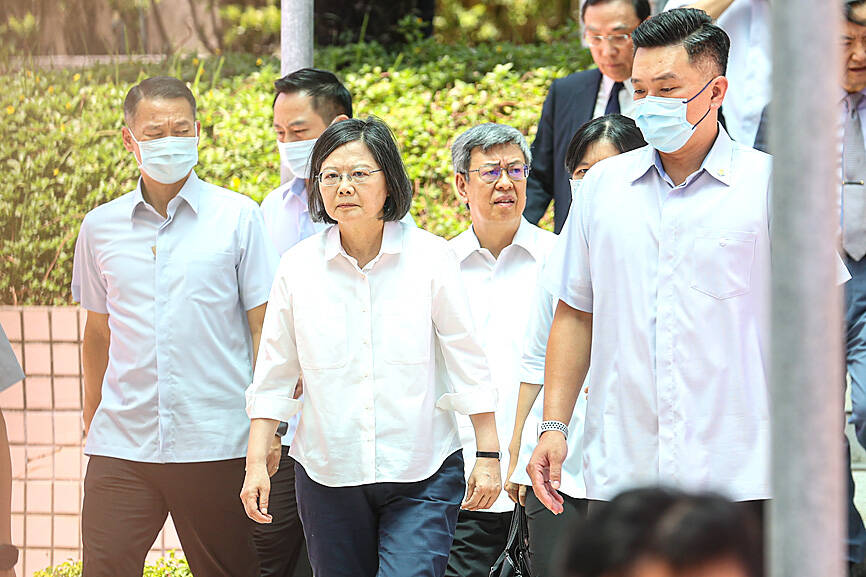On the 36th anniversary of the lifting of martial law, President Tsai Ing-wen (蔡英文) yesterday spoke of learning from the past to achieve reconciliation while visiting a former military prison in New Taipei City’s Sindian District (新店) where many political prisoners were incarcerated under martial law.
The former prison is now the Sindian Drug Abuser Treatment Center managed by the Ministry of Justice.
Tsai said the site was used for a long time as a military prison and is among Taiwan’s 42 “Historical Sites of Injustice.”

Photo: CNA
Lei Chen (雷震), a political activist and publisher of the influential Free China (自由中國) magazine in the 1950s, was incarcerated at the prison, as well as Huang Hsin-chieh (黃信介), Yao Chia-wen (姚嘉文) and Chang Chun-hung (張俊宏), leaders of Taiwan’s early democracy movement who were imprisoned in the 1979 Formosa Incident, Tsai said.
“These Taiwanese democracy pioneers were incarcerated here, but they never wavered and did not submit to the authoritarian regime, despite having to endure much suffering,” Tsai said.
“The Historic Sites of Injustice aim to remind people of our shared past, as well as the need to safeguard the democracy and freedom we enjoy today,” she added.
Tsai urged government agencies to promote transitional justice and to think of creative ideas to preserve the historic sites for educational purposes.
“This is the way to achieve justice and achieve reconciliation, for Taiwan to emerge from the dark shadows of the past,” she said.
Taiwan would work to become “the beacon of democracy and human rights” in Asia, Premier Chen Chien-jen (陳建仁) said at the event.
“Taiwan’s freedom, democracy, and rule of law all came from the sacrifices and relentless struggle of the early democracy activists,” he said. “Therefore our government must promote transitional justice.”
The government would preserve historical documents and political files, and work to identify the perpetrators of historic atrocities, he added.

WANG RELEASED: A police investigation showed that an organized crime group allegedly taught their clients how to pretend to be sick during medical exams Actor Darren Wang (王大陸) and 11 others were released on bail yesterday, after being questioned for allegedly dodging compulsory military service or forging documents to help others avoid serving. Wang, 33, was catapulted into stardom for his role in the coming-of-age film Our Times (我的少女時代). Lately, he has been focusing on developing his entertainment career in China. The New Taipei District Prosecutors’ Office last month began investigating an organized crime group that is allegedly helping men dodge compulsory military service using falsified documents. Police in New Taipei City Yonghe Precinct at the end of last month arrested the main suspect,

A cat named Mikan (蜜柑) has brought in revenue of more than NT$10 million (US$305,390) for the Kaohsiung MRT last year. Mikan, born on April 4, 2020, was a stray cat before being adopted by personnel of Kaohsiung MRT’s Ciaotou Sugar Refinery Station. Mikan was named after a Japanese term for mandarin orange due to his color and because he looks like an orange when curled up. He was named “station master” of Ciaotou Sugar Refinery Station in September 2020, and has since become famous. With Kaohsiung MRT’s branding, along with the release of a set of cultural and creative products, station master Mikan

LITTORAL REGIMENTS: The US Marine Corps is transitioning to an ‘island hopping’ strategy to counterattack Beijing’s area denial strategy The US Marine Corps (USMC) has introduced new anti-drone systems to bolster air defense in the Pacific island chain amid growing Chinese military influence in the region, The Telegraph reported on Sunday. The new Marine Air Defense Integrated System (MADIS) Mk 1 is being developed to counter “the growing menace of unmanned aerial systems,” it cited the Marine Corps as saying. China has constructed a powerful defense mechanism in the Pacific Ocean west of the first island chain by deploying weapons such as rockets, submarines and anti-ship missiles — which is part of its anti-access/area denial (A2/AD) strategy against adversaries — the

Eleven people, including actor Darren Wang (王大陸), were taken into custody today for questioning regarding the evasion of compulsory military service and document forgery, the New Taipei District Prosecutors’ Office said. Eight of the people, including Wang, are suspected of evading military service, while three are suspected of forging medical documents to assist them, the report said. They are all being questioned by police and would later be transferred to the prosecutors’ office for further investigation. Three men surnamed Lee (李), Chang (張) and Lin (林) are suspected of improperly assisting conscripts in changing their military classification from “stand-by